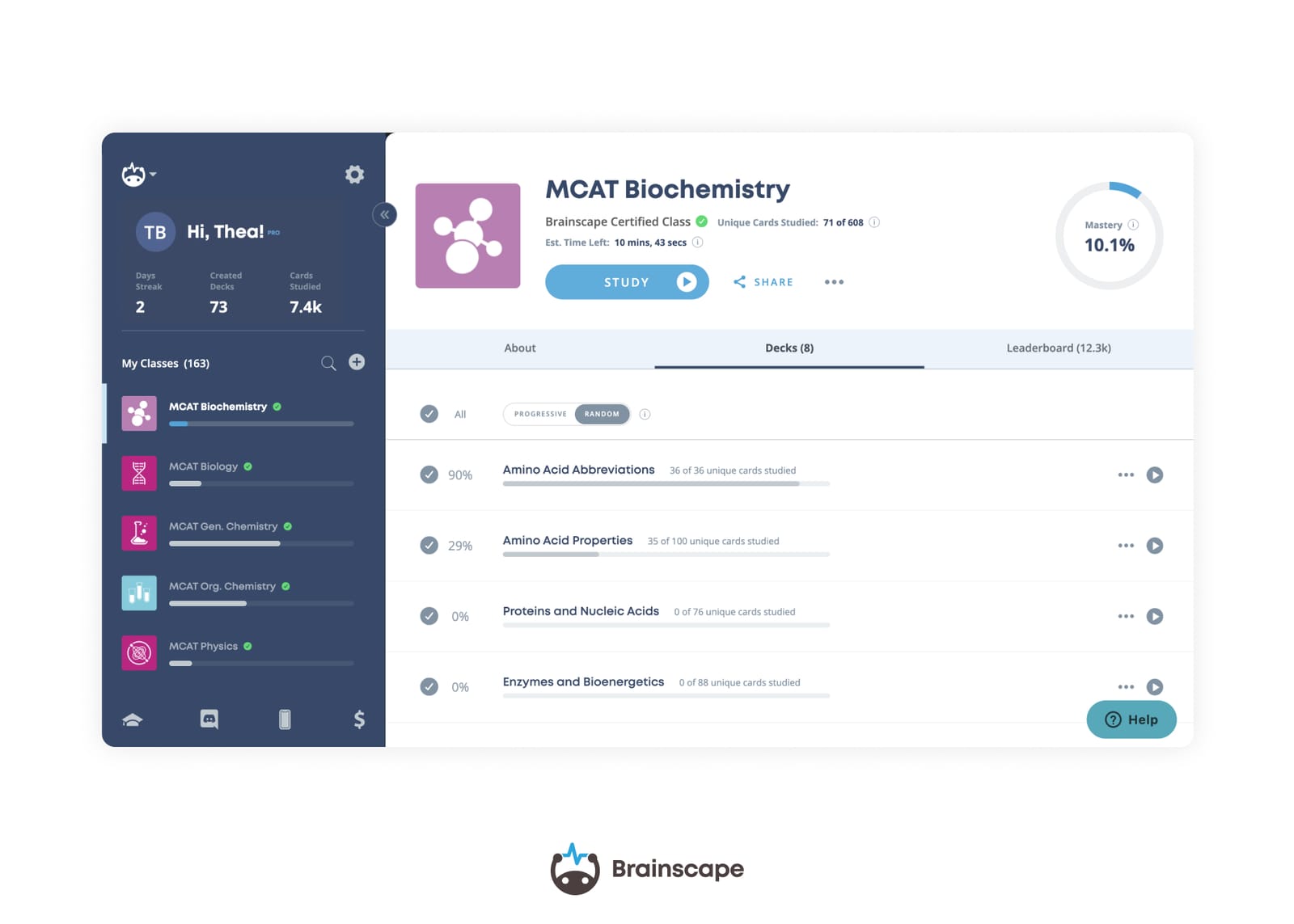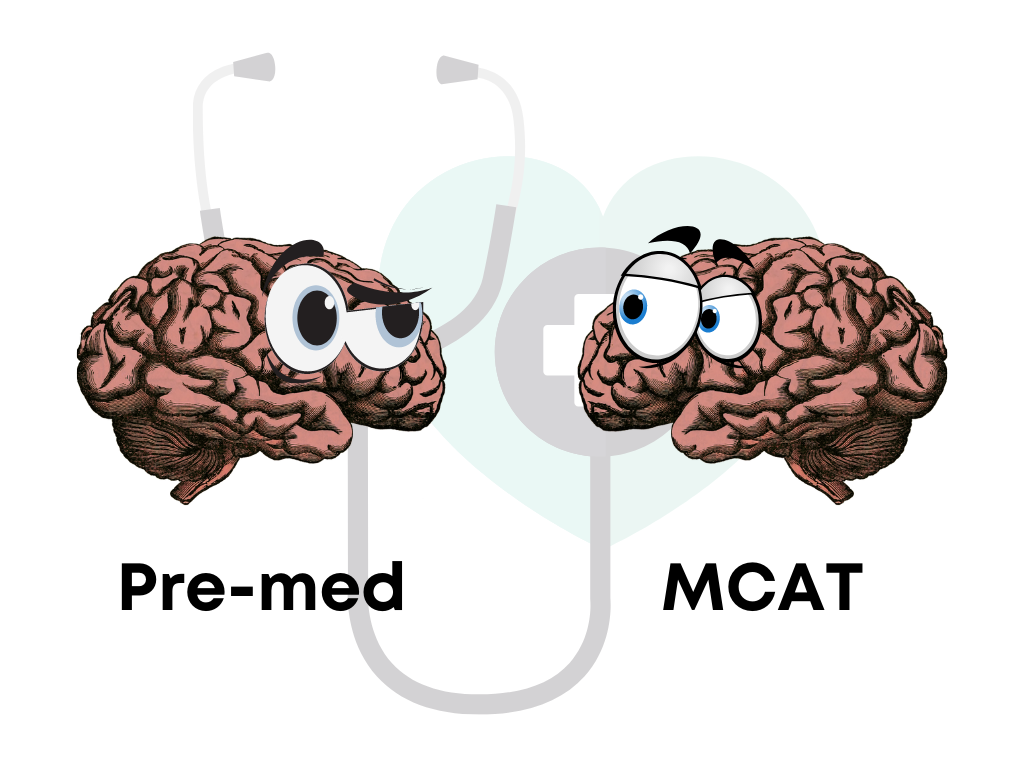There’s this funny paradox in premed education, at least in the U.S. The idea is that the MCAT is designed, in part, to test what you learned in college premed courses. In turn, at many colleges, one goal of those courses is to prepare you for the MCAT.
This circularity would be fine, except that premed courses and the kind of thinking they reward are fundamentally different from the MCAT and the reasoning it rewards. This dissonance is really, really important for medical students to understand because it can lead them astray in their MCAT preparations.
“I can’t even venture a guess at how many students I’ve worked with who have been hurt by mistaken assumptions that stem from college classes,” says Clara Gillan. “Hundreds, at least.”
And so, understanding the differences between premed and MCAT classes is vital, even if you’ve already started prepping and feel like you know the MCAT pretty well.
The Key Differences Between MCAT Classes And College Courses
Gird your loins! Whether you’re diving into your MCAT classes or still wading through premed courses, here’s what you need to know to launch yourself over the hurdle that is the MCAT and embark upon an exciting education in medicine!
In MCAT Courses, Subjects Overlap And Intertwine
In undergrad, your general chemistry, molecular biology, and physics classes are completely independent of each other. You’re pretty much NEVER going to find a molecular biology question on your physics exam (and vice versa). In other words, your premed classes are completely discrete and don’t overlap.
In fact, not even the topics within those classes overlap. For example, most second-semester physics and organic chemistry courses mainly stick to testing second-semester content, rather than requiring you to use both second and first-semester concepts together. So it’s like once you’ve learned a subject, you leave it behind you.
The MCAT is … well … different.
The MCAT test-makers love overlap; they thrive on it, to the point that you can actually predict which topics are high-yield by thinking about how much overlap they could potentially involve.
Take amino acids, for example: the most famously high-yield topic on the current MCAT and one of the only topics that is tested heavily in both the chemistry/physics and biology/biochemistry sections.
In theory, all amino acid questions are biochemistry questions. But the test-makers can write amino acid questions that require you to understand functional groups, which is an organic chemistry concept. They can write amino acid questions that require biology knowledge. And they can write amino acid questions centered around general chemistry, as with most amino acid-based chemistry questions.
With so much potential for overlap, is it any surprise that MCAT examiners love testing amino acids so much?
Moreover, the opportunities for overlap in individual questions pale in comparison to the overlap that’s possible in passages. Passages in the science sections almost always involve overlap among topics or subjects, and being aware of it is crucial as you prepare and practice for the MCAT.
As for why this is the case, it’s simple: the real-life problems and issues that doctors face aren’t confined to small, individual subject areas. Rather, they are a glorious and complex blend of the sciences.
In other words, before you’ve even set foot in the examination room, the MCAT is teaching you to think like a doctor.
College Courses Prioritize Memorization

The second difference between premed courses and the MCAT is one that’s discussed relatively often: premed courses reward memorization more than the MCAT does.
I still remember my junior-year biochemistry class, where we had a couple of weeks to memorize all of the enzymes and substrates involved in eight metabolic processes. With memories like this fresh in your mind, it’s really easy to begin your MCAT preparation with a memorization-centric mindset. “As long as I know the facts, I’ll do well.”
The problem is, this mindset can manifest as a desire to memorize unnecessary information, like the exact structures, atom by atom, of amino acids like histidine and arginine.
Other times, though, it arises more subtly in the form of misplaced confidence: the idea that as long as you memorize enough relevant information, you’ll achieve MCAT success, and if you aren’t succeeding yet, it must be because you lack pieces of content info.
Preparing to take on the MCAT requires a combination of knowing the content and deeply understanding it, and how it is woven into the greater science tapestry. Each and every fact is tied to countless others and your ability to see the grand picture and relate each piece of knowledge within this framework is the key to much greater MCAT success.
Don’t get me wrong: preparing for the MCAT requires a whole lot of content memorization. Just don’t make the mistake of only learning the facts and neglecting to exercise your critical thinking muscles through practice tests.

By the way, if you need help memorizing the facts, make sure you get your hands on digital flashcard apps like Brainscape or RemNote. They're proven to increase MCAT scores by using active recall and spaced repetition.
Active recall means that they require you to retrieve the answer to a question from scratch instead of passively recognizing it in your notes, which improves your learning speed even if you get the answer wrong! Spaced repetition means that they show you the same concept again at just the right interval, locking it into long-term memory faster. In fact, flashcard apps with adaptive algorithms, such as Brainscape or Anki, have been proven to dramatically increase learning efficiency for medical students. This, in turn, increases their confidence and lowers their stress levels.
Moving on, the point we have made above ties into the next key difference between premed MCAT courses, and it’s a significant one, so pay attention ...
Critical Thinking And Passage Analysis Skills Are Essential For Strong MCAT Scores

Unless you had a really unusual professor, you probably didn’t have passages on any of your premed science midterms or final exams. It’s just not a professor’s instinct to provide you with (and even test!) material that they didn’t teach you.
But this is exactly what the MCAT does!
Your first MCAT practice exam might be your very first experience with passages that contain information you’ve never learned before. So it’s not really surprising that so many students have trouble discerning which of their mistakes come from a lack of knowledge and which ones come from misreading a paragraph or making an incorrect assumption about a figure.
When combined with the memorization-focused mindset I mentioned earlier, this often leads to undervaluing passage analysis and overvaluing content review.
Just think about it: if you saw that you missed a question on a full-length practice exam, would your first reaction be “shoot, where was that in the passage?” Or would it be “stupid me, I must not have studied this enough”? (Hint: it’s probably the latter.)
Remember this as you work your way through your MCAT courses: invest as much energy learning the facts as you do practicing MCAT test questions. The former will equip you with the content and understanding, and the latter, the critical thinking and analysis skills to answer questions.
MCAT Math And Premed Math Are Two Different Beasts
The fourth difference is more specific, but it can be surprisingly harmful to your MCAT preparation. Here goes: the math in your premed classes is extremely different from the math in the MCAT.
Pre-med college courses that involve math, mainly general chemistry and physics, are often tested using relatively nasty numbers and multi-step calculations, and calculators are often provided. Just page through the practice problems in any general chem stoichiometry section, and you’ll see answers along the lines of “1.18 moles” or “34.96 grams.”
This can lead to both an obsessive focus on exactness and, perhaps more familiarly, a brief sense of total panic when you learn that the MCAT doesn’t provide a calculator. You may be many things, but John von Neumann you are not.
Depending on where you are in your prep, you might already know that it’s okay that no calculator is provided because you don’t need one: calculations down to two decimal places just aren’t the MCAT’s thing, unless there’s a shortcut to get you there.
But even once our calculator-related panic has subsided, the intoxicating effects of college premed math can persist. Namely, they manifest as (1) a reluctance to round or estimate and (2) a failure to notice math shortcuts that could make life much easier.
For example, imagine a problem that requires you to convert 0.36 grams of glucose to moles, given that the molar mass of glucose is about 180 g/mol. The first reaction of almost everyone to this problem is panic, along with mental preparation for nasty decimals or even long division. But MCAT math problems usually aren’t nasty, and in fact, this one can be solved by converting both values to scientific notation and tweaking them a bit to make the numerator easily divisible by the denominator.
This is simply not a thought process that college exams, bristling with complex, calculator-requiring questions, facilitate.
The MCAT Is Structured Around One Goal: Preparing Your Brain To Become A Good Doctor

The last difference between premed and MCAT courses is a small one, but it can provide you with additional clarity on the MCAT examiners’ mindsets. Specifically, the MCAT was constructed around a coherent goal: to test the thought processes that they believe are possessed by good future doctors.
Regardless of how you might feel about their execution of that goal, it’s undeniable that that’s what they are trying to do.
Pre-med courses, in contrast, often lack such a goal: maybe the professor just wants to check off topics from a list, or maybe they wish they were in their lab doing research on heat sensation, and so they ask a million questions about this one specific capsaicin receptor or something.
(If you didn’t already guess, I had a biology professor who LOVED his capsaicin receptors. Spoiler: capsaicin receptors are not on the MCAT.)
Details aside, it’s usually impossible to look at each question on a premed college exam and see what it contributes to the service of that goal.
In contrast, the MCAT allows for predictions about what will be tested and how. Fluids come up commonly, and if they do, they’re likely to be tested in the context of blood vessels. You won’t see 12 questions in a row about SN1 and SN2 reactions, or (quite possibly) even one. You’re also likely to be tested on insulin and glucagon at some point. And so on and so forth.
These predictions aren’t enormously valuable, but they eliminate some of the unpredictability that (in premed) stems from the professor waking up angry one morning and deciding that the only question on that day’s quiz is going to be a ten-step synthesis reaction.
A Final Note On MCAT Classes Vs College Courses

A really important part of taking on the MCAT is knowing the exact nature of the beast you intend to do battle with. MCAT preparation isn’t just about equipping yourself with a mountain of knowledge; it’s also about using that knowledge intelligently to answer questions. It’s about critical thinking and question analysis, which doesn’t make it scary … just different.
These are crucial skills in medicine. When faced with a client or scenario, you’re probably required to stitch together a deep understanding of, for example, molecular biology, organic chemistry, and physics to diagnose the problem and recommend an intervention.
I said it before, and I’ll say it again: your MCAT preparation is teaching you to think like a doctor. And how awesome is that?
Additional Reading
- Top Med School Admissions Tips
- Advice For Taking The MCAT Twice (Or More)
- How To Cope With Distractions In MCAT Prep
References
Cole, R., McHugh, D., & Netter, F. H. (2017). Assessing emotional stress, active recall and digital spaced‐learning media in the Study of Thoracic Gross Anatomy by Medical Students. The FASEB Journal, 31(S1). https://doi.org/10.1096/fasebj.31.1_supplement.580.7
Deng, F., Gluckstein, J. A., & Larsen, D. P. (2015). Student-directed retrieval practice is a predictor of medical licensing examination performance. Perspectives on Medical Education, 4(6), 308–313. https://doi.org/10.1007/s40037-015-0220-x
Kerfoot, B. P. (2010). Adaptive spaced education improves learning efficiency: A randomized controlled trial. Journal of Urology, 183(2), 678–681. https://doi.org/10.1016/j.juro.2009.10.005
Kornell, N., Hays, M. J., & Bjork, R. A. (2009). Unsuccessful retrieval attempts enhance subsequent learning. Journal of Experimental Psychology: Learning, Memory, and Cognition, 35(4), 989–998. https://doi.org/10.1037/a0015729
